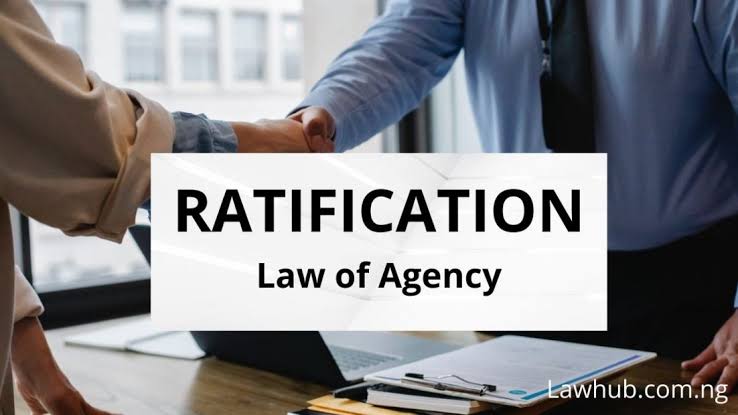N.B. This article is particular to Nigeria.
Ratification
Would you like to know what ratification in commercial law is all about? Well, keep reading.
In discussing the creation of agency relationship, we often describe a situation where the agent has antecedent authority. On the other hand, there may be no antecedent authority, yet the agent purports to act on behalf of the principal. An agency by ratification, may be created whenever the alleged principal accepts or otherwise affirms the act of one purporting to act on his behalf even though there was no agreement authorizing the act.
Ratification is deemed to apply to consent which may be necessary in essence being that the prior authorization is treated as if it had been authorized by the alleged principal from the outset. It is thus RETROSPECTIVE IN NATURE, and has the effect of constituting the act so performed into that of the alleged principal, thereby making him liable. Thus, the doctrine of ratification was explained by TINDAL C.J in WILSON V. TUNMAN.
Validity For Ratification
In order to successfully rakes the issue of ratification, the purported set of ratification must be valid and effective. To be valid and effective, certain requirements must be fulfilled. In Firth v. Staines, wright j. gave three conditions
- The agent whose act is sought to be ratified must have purported to act on behalf of the principal.
- At the time the act was done, the agent must have had a competent principal
- At the time of the ratification, the principal must be legally capable of doing the act himself.
These requirements require further examination
- EXISTENCE OF COMPETENT PRINCIPAL: the alleged principal in order to effect a valid ratification must be in existence at the time the act was supposedly performed on his behalf. It is not sufficient that he will come into existence at some determinable future. Thus, a principal must be I. A natural human being II. Or a juristic person.
The caser of CALGARI V. GLOVANNI SARFARI, provides an adequate illustration. - ACT MUST BE ON BEHALF OF PRINCIPAL: The act of ratification can only be validly executed by the alleged principal on whose behalf the act was performed. It follows that such act must have been done on behalf of the alleged principal. In Folashade v. Duroshola, it was held that there would be no ratification unless A purported to act as an agent and to act for B in relation to the contract.
- LEGAL QUALITY OF THE ACT: Generally, the principal may ratify any act which he could have authorized at the time the act was being performed. However certain acts are not capable of ratification. Thus, an act which the principal could not have authorized in the first place because it was illegal to public policy does not become effective by ratification. This is evident in urhobo v. chief j.s tarka.
- TIME OF RATIFICATION: ratification in order to be valid must be within a time limit. In folashade v. duroshola, it was held that a proper case of ratification is subject to the important question that ratification must be within a reasonable time after which an act cannot be ratified. As seen in BIRD V. BROWN, where the agent and third party stipulates time for ratification, the principal can validly ratify only if he acted within the period so prescribed.
There are 3 qualifications which have be given to limit the operation of the doctrine of ratification
- Ratification will not be allowed to prejudice the vested right of a third party.
- If the third party’s offer is made subject to ratification then the offer is conditional.
- If anything happens before ratification, but after the third party had withdrawn his offer, he will be entitled to enjoy the advantages of such offer.
Contributed by: Abdulganiyu Ismail (AKA) Mastermind
Prepared and Written by: Ucheakonam Chijioke Joshua (CJ)


Leave a Reply